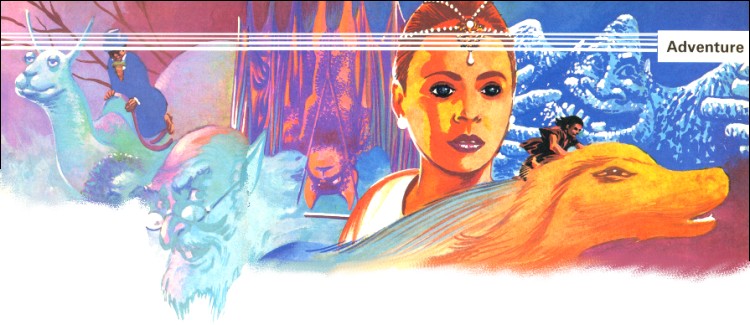
Richard Price searches for a genuine hero ...
Judging by some of the mail I get, it seems that many adventurers think that game reviewers possess some form of magical amulet to help them solve any and every adventure without so much as a drop of perspiration. Not so. Like everyone else I've wasted hours, sometimes days, locked in cells, stuck in wells or straddled across some vertiginous chasm waiting for the stroke of genius that will get me home safe with the treasure, or the breathtakingly lovely princess. Verily the sweat has poured forth on those occasions.
There's quite a lot of help around if you investigate. Naturally, you will first write to the Fat One at the Ogre. His Vastness' drinking habits put him in touch with many rumours and tips. Companies are surprisingly helpful and many provide help sheets - but remember, they won't give complete solutions.
Level 9, Artic, Incentive, Adventure International and many others give help, though some may charge for booklets which list problems in more than one of their games.
Modem users can access the accumulated knowledge of many dedicated players on Prestel Clubspot 810. There are pages giving hints on specific games and a large section for those seeking help.
I've also been sent a mailshot from the Adventurers Club - London NW2. They offer help, newsletters, discounted games and a telephone helpline. The subscription fee is £10.95 for those living in the UK.
So, to business. Movie spin-offs are big business these days and it's often difficult for programmers to produce games of a film or TV series without causing pain to those punters who've already formed a clear view of the fantasy or storyline. Disappointed players of The Tripods game will know what I mean.
|
Ocean has a justified reputation for doing well in the spin-off field. The latest offering is The Neverending Story, a text version of the fantasy film of the same name. The game comes in three sequential parts totalling more than 100K of code and data - a big, long game which should keep any player going for a long time.
The setting and background story is fairly standard for this type of fantasy. The many peoples of the realm of Fantasia are full of sadness and dread. They face total extinction from the encroachments of the All-consuming Nothing and, because their magical world needs the belief and imagination of others to keep it alive, they desperately seek a saviour to show renewed interest in them.
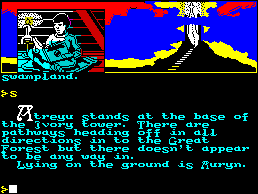
Back in reality, a young lad with a name calculated to give great joy to those who relish tasteless plays on words - Bastian Balthazar Bux - finds the book within which Fantasia exists. He reads The Neverending Story and raises the hopes of the depressed Fantasians. They appoint a small boy, Atreyu, as their hero and despatch him to find their saviour, the young Bux. You guide Atreyu through the landscape of Fantasia and will thus, hopefully, rescue the land from disaster.
The game opens in the forest kingdom where the Empress of Fantasia dwells in her Ivory Tower. She too is suffering from the wasting away caused by Nothing.
Time is short and you must search the forest to find the precious medallion Auryn which holds the strength of Fantasia. That is quite easy and you should also find other items scattered about. There is a horn which can be used to summon Falkor the Luckdragon and a useful piece of information about the rough location of the saviour. That is obtained from Morla, the ancient and gigantic tortoise who lives in a disintegrating and swampy region beyond the trees.
There are a number of other characters in the game. Gmork the Werewolf is the most notable and the most dangerous, and, given a chance, he will trail and destroy you. If you dawdle, time will pass and danger will approach so it's wise to stay one step ahead of the evil one.
The game presentation is very attractive. The top third of the screen contains a general background picture of the area you're in. Superimposed on it are graphics showing your possessions and sometimes a picture of a particular character or action. The graphics are fast and don't interfere with the game at all. They're also very slick and good-looking.
The text is displayed in a pseudo-uncial script. That gives a nice feel for the setting but can be occasionally difficult to read. The descriptions are long and evocative. Sometimes character actions occur at the same time as a location description and the whole location text scrolls up before you've had a chance to read it. Just retype 'look' to get it back.
Input and response are fast and the messages are usually useful. However, there is no examine function, which I found quite a disadvantage. All right, I know we're all meant to find out what objects are for, but examine is a fairly traditional way of getting extra information in adventures and I'm surprised to see it left out. On the other hand it does have the positive effect of making you work hard to solve the multitude of problems.
All told Neverending Story is a big, attractive adventure with plenty of polish and professionalism in its production. The story line is no big deal but that's not the game's fault. The program playability, colour and speed all make up for that and with three parts to play, it's also good value for money.
|
Well, here it is ... the next delightfully demented offering from the fervid and fertile imaginings of Fergus McNeill and Go, only begetters of the already justly infamous Bored of the Rings.

First take Sherlock Holmes, dress him in Lincoln green and plonk him down in Sherwood Forest with a cordless phone, a plastic bow and a long dark sword called Albino. Then take liberal helpings of stubble-chinned transvestite nuns, mafiosi Smurphs, Merry Men, the Three Bears in a hanging mood, the Wizard of Oz and assorted cabbies and villains ... not forgetting Hum the Hunter whose major interest is collecting sheds and stuff to go in them. Now throw in a lot of trees, a railway station and a few public conveniences, a Kentucky Fried Squirrel franchise and the odd mystical hill and Druids' Circle. Et voila! You now have a rough idea of the recipe for Robin of Sherlock, the latest Quilled adventure from Delta Four.
The game uses the full resources of Gilsoft's adventure system and features newer, faster, split-screen graphics for a large number of locations, sound effects ... the damn phone keeps ringing, either with wrong numbers or Lestrade's mother hurling abuse ... and the useful RAMsave and RAMload to store a position without using the tape recorder. Input and response are fast and friendly with a wealth of zany detail.
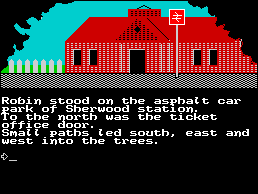
What's it all about? It's hard to find a place to start! Being a medieval freedom-fighting detective is a tough number. There are numerous crimes to solve ... who killed dead Watson, who kidnapped Toto from the venomous brat Dorothy, why are the nuns running some heavy racket involving recycled Smurphs sold as garden gnomes, and who nicked the cabbies' hansom?
Then again what does the Godfather Smurph do behind his protective screen of minders, and why does Hum rip off people's gear and store it in vast garden sheds scattered around Sherwood? Phew, and that's only a starter. Oh, and who put the laxative in the Three Bears' porridge? That's quite an easy one really because you arrive at their cottage to find them putting up a gallows to lynch Goldilox.
The characters can be interrogated and will all have some crummy alibi or excuse for their actions. The descriptions are funny - hilarious at times - and the examine command produces a vast amount of daft detail. As in Bored you can carry enormous quantities of objects, most of them utterly improbable but useful at some point. If you remember to collect the Kentucky Fried Squirrel barf-bag hat from the restaurant in part one you may find it very useful when trying to enter Nottingham Castle. But what can I do with the electric carving knife and can I use the 'mystic, ancient and out of order coffee machine set into a great sausage shaped obelisk' inside the stone circle?'
The game is in three parts, each continuing the map of Sherwood and its surroundings. That means more than 200 locations to explore and vast swathes of text to enjoy. Robin of Sherlock seems much more detailed than Bored and really benefits from the recent improvements to the Quill system. There is always something to explore, plenty of crazed action - watch portly Friar Gorbachetnik explode after his 31st venisonburger - and the game is thoroughly playable and engaging.
I am utterly unashamed about awarding this game a Classic rating. It is knockabout, loopy farce of the best kind with a pace and zip about it that leaves 90 per cent of other games miles behind. Absolutely smashing!
|
Everyone who enjoys Steve Jackson's and Ian Livingstone's fighting fantasy adventure books will be glad to see Seas of Blood from Adventure International. The game, in Adventure International's regular style, is based on one of the duo's plots and casts you as a pirate captain. With your villainous crew and trusty ship Banshee you set sail from Tak, den of cut-throats and thieves, to plunder the Inland Sea.
You can pilot your ship around those land-locked waters and attack the trading vessels that ply between ports like Assur, Lagash and Calah. When you reach a port you can go ashore and explore the mysterious lands outside the towns. There you'll find ancient dead cities, tombs and catacombs, oases and hapless caravans loaded with plunder and provisions all for the taking. Your final aim is to collect 20 treasures and take them to the top of the great mountain in Nippur at the southern end of the Inland Sea.
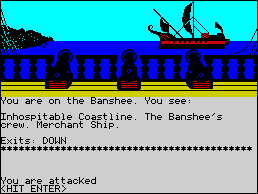
The Jackson-Livingstone format is well implemented by the use of text, graphics and combat routines which allow you to fight both ships and the men and monsters you will encounter on the land. The movement and messages are handled as in a normal text adventure with different instructions for land or sea journeys. When aboard you must always use 'Sail' followed by the direction - written in full. When ashore you can use the normal N,S,E,W abbreviations.
As in the books, combat is decided by simulated dice throws added to your stamina figure - which may well decrease if you are repeatedly wounded or hit. Your crew must be kept provisioned if they are not to mutiny so you have the added task of searching out victuals to keep them sweet. All that gives a variety of game tasks which help to keep the pace up. You cannot afford to be complacent or idle if you want to survive this violent world.
The graphics are well up to the company's usual standard, being fast and colourful. The interpreter is friendly and informative though the descriptions are not big - with detailed graphics for almost every location that doesn't seem to be a problem.
Remember that you can board some of the vessels you attack - the stately Barge is quite important from that point of view - and generally you can only go ashore at ports. It is wise too to keep a weather eye on your status screen to check out your provisions and crew strength. You may have to hire crew when too many have been killed, though I never got that far.
The variables make for an action-packed adventure which keeps you on your toes and the programming quality is just as good as the company's other games. Recommended for swashbucklers and armchair Long John Silvers.
|
As far as I recall, The Quest for the Holy Grail isn't a new game and was originally by Dream Software. Whatever the case, Mastertronic has snapped up this mixed text and graphics game for their £1.99 range.
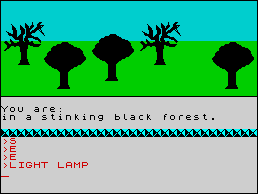
Python aficionados will remember the bizarre film of the same name with an Arthurian Britain populated by anarcho-syndicalist mud gathering peasants and cowardly knights, some of whom tended to say odd things like 'Nic' unless quickly dismembered.
The computer program adopts the same whacky approach to the subject matter and you must wander the evil wasteland in search of the fabled cup, adopting the guise of Sir Tappin. Both Camelot and the surrounding countryside is populated by a variety of weird creatures - exploding white rabbits, three-headed knights, CND demonstrators, and holy hand-grenades. There are also the knights who say odd things - beware particularly of the knight who says 'Sic' ... he really means it. Somewhere within this medieval horror jumble - with liberal doses of anachronism - lies the cup that cheers.
The graphics are fairly slow as are the responses. 'Examine' is not always fruitful but in general the replies are humorous and sometimes downright cantankerous. On asking for an already described object to be examined I was first told, 'Why didn't you pay attention the first time?'. A second request was met with a simple 'No'.
Camelot is easily found but it's not so simple to get past the violently nauseous retainer who bars the way. Before you do that you will probably want to seek out the jester's Hat of Invisibility to escape the murderous intentions of Eugene, Wielder Of the Vic-20. Asking for help is also often fraught with difficulty as the interpreter will sometimes refuse, saying, 'Get lost, I'm sulking!'
The Quest for the Holy Grail, despite its rather dated programming, is still a humorous game with a cheeky interpreter and some silly messages mixed into the bizarre problems. You could do a lot worse at two or three times the price.
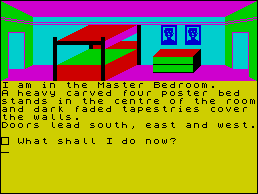
|
Talking of doing worse we come to Terminal Software's Merlock the Mede. This double-sided production offers a graphic adventure on side one and a plain text game on side two. Merlock is meant to be some sort of time traveller but that has no real bearing on the games.
The graphics game is called The Deeds of Glengarry Hall and mainly consists of a search around a vast and empty mansion.
The plain text game is a straightforward search through another empty and fairly unresponsive landscape for Count Alucard the vampire. There are a few monsters to slay but, as the examine command keeps telling you, 'There is nothing of interest'. I'm afraid the only stunning thing about this game was its appalling grammar and almost total lack of punctuation. Viz ... 'you are in the hallway of the rectory there was some steps up to the landing but they look to fallen down a long time ago.' Or ... 'a peace of paper' and 'you can smell something fowl'. A rat I expect.
|